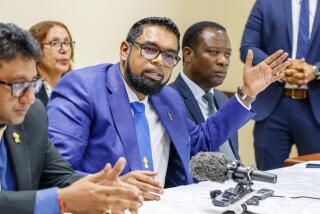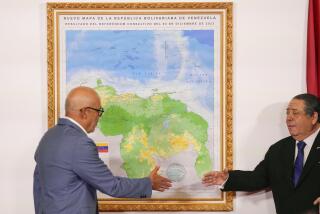Outlook Gets Brighter in Guyana as Reform Takes Hold : Latin America: Improvement may be too little and too late, however, to avert an opposition victory in the presidential election before year’s end.
- Share via
GEORGETOWN, Guyana — Farmers foresee a bumper rice crop, gold sales are breaking records and even the telephones work.
Government officials say a long, painful process of economic reform is starting to pay off for the 750,000 long-suffering citizens of this small nation on South America’s north coast.
It may be too little and too late, however, to avert an opposition victory in the presidential election.
President Desmond Hoyte, 62, who is to call an election by year’s end, launched an effort in the late 1980s to dismantle the tottering socialism left by his predecessor, Forbes Burnham, and build a free market.
Burnham, who led the country from independence in 1966 until his death in 1985, believed in state control.
His legacy included government ownership of four-fifths of economic production, including the nationalized bauxite and sugar industries. Thirty state corporations were kept in business by government subsidies and bans on imports ranging from sardines to candy to carpets.
Hoyte rewrote the rules for foreign investment, offering tax breaks and providing guarantees for multinational corporations that set up shop in Guyana. He began selling or trimming unprofitable state companies and loosened the rigid foreign exchange policy.
Kenneth King, a special adviser to Hoyte, said the liberalization has begun to work.
“For 1991, unless some unseen catastrophe occurs, we’re going to have a growth rate in real terms of between 3.5% and 4%, which is fantastic,” he said in an interview. “I don’t know when last we had something like this.’
Only once in the last decade did the economy have a growth year--about 2.5% in 1984. As the decade ended, some experts said Guyana was starting to rival Haiti as the hemisphere’s most impoverished nation.
Reforms helped curb inflation, but prices of many goods have continued rising because of deregulation, while wages have fallen behind. The end result for many Guyanans is the same as before: less and less money for essentials.
The minimum legal daily wage is equivalent to 50 cents, much less than the 80 cents needed to buy a pound of chicken. A doctor at a government clinic or hospital earns $100 a week.
James Ogle, a U.S.-trained veterinarian employed working for the government, said of his $75 monthly salary: “I can’t live on it. I can’t buy anything,” so he does private work in his spare time.
About 2,000 union workers held a protest rally in late July, demanding a minimum wage equal to $4 a day.
“People are building one-room shacks everywhere,” Gordon Todd, president of the Clerical and Commercial Workers Union, said at the demonstration.
Polls show a 73-year-old leftist, Cheddi Jagan, leading in popularity for the presidency. Despite a long history of championing Marxism, Jagan says he would continue efforts to attract foreign investment.
He became premier in 1953, when Guyana still was a colony. After five months, Britain suspended the constitution and removed him, saying it feared the spread of communism.
Jagan and his People’s Progressive Party claim the sale of state interests was carried out in secret, at bargain prices, but do not criticize the idea of going private.
His candidacy is backed by fellow descendants of East Indian indentured servants, who make up half the population and are the largest racial group in Guyana.
Because of the long economic decline, he may also attract votes from the other main group--descendants of black African slaves, the main support for the governing People’s National Congress.
Guyanese elections historically have been marred by charges of fraud. Hoyte has pledged to keep the next one clean, and has invited foreign monitors.
He and his party have some accomplishments to talk about.
Gold production last year topped 40,000 ounces, breaking a 49-year-old record and supplying desperately needed foreign exchange. Hoyte’s aides say a new, more flexible payment system allows the state to compete effectively with the once-booming black market for currency and gold.
The spring crop of rice, an important export, was 67,000 tons, up 37% from last year. Officials expect production for the entire year to reach 167,000 tons, 57% more than 1990.
Authorities say the increase resulted from the sale of state-owned rice mills to a private company that pays farmers better amd more promptly.
The telephone company’s general manager, Jimmy Kean, said three of five calls from abroad never made it into Guyana in the past because of antiquated switching equipment and too few circuits.
He said the private owners who took over in January had tripled the number of circuits with the United States, Canada and Britain, so most calls make it on the first try. Guyanans now can dial overseas directly instead of having to wait for operators.
More to Read
Sign up for Essential California
The most important California stories and recommendations in your inbox every morning.
You may occasionally receive promotional content from the Los Angeles Times.













